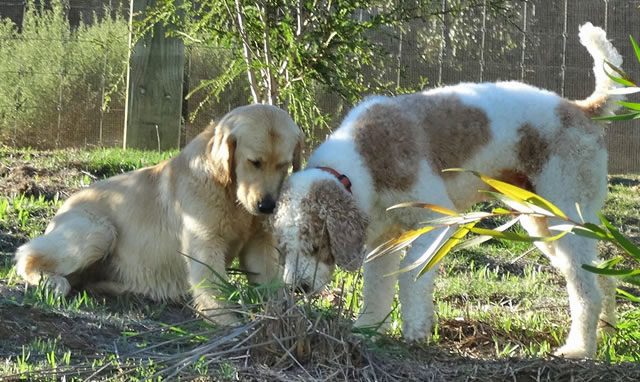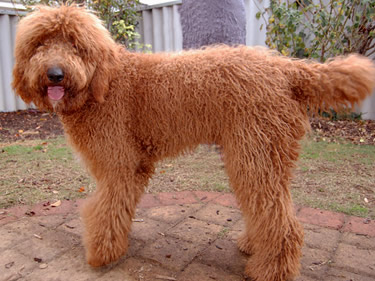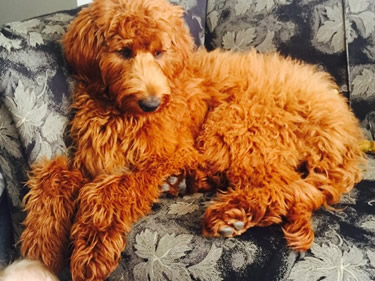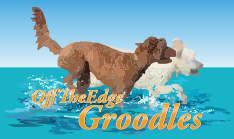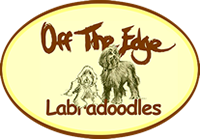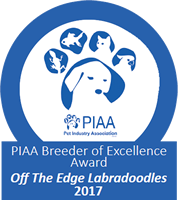
The best way to ascertain if you are feeding correctly is to feel your dog’s ribs. You should just barely be able to feel them, as they should have a light covering of fat. If you can’t feel ribs, your dog is overweight, but if you can really feel ribs your dog is underweight.
During growth spurts your puppy’s ribs may occasionally become easy to feel, which is ok for a short period of time during growth spurts, but increase food quantities.
The better quality foods lead to less puppy smells at both ends, and smaller firmer poohs. Follow the feed guide on food packet; be careful not to over-feed as it can cause diarrhoea.
Timing & Food
Use stainless steel or other stable, unbreakable bowls as they are easy to clean and puppies can't chew them. It is a good idea if you feed puppy Delicate Care Puppy kibble, as it is what we have been feeding puppies. There is no problem changing to another brand, however it must be done very gradually, over a week. It is recommended you use good quality Kibble brands.
It is advised to use premium quality foods which are a completely balanced food including calcium, minerals, vitamins, etc. for growing puppies. The better quality foods also lead to less puppy smells at both ends, and smaller firmer poohs. Here at OffTheEdge labradoodles, the puppies and mums have access to Kibbles all day long. They eat when they want/need to, this way they don’t binge.
Your Puppy will have been fed on Perth made Delicate Care Premium High Energy Puppy Kibbles, and with Lyka meals which are freshly prepared, lightly cooked and made with high quality, human-grade ingredients. These meals are nutritionally balanced and vet-formulated, so we know we’re giving them the best possible start. With Lyka, puppies are supported through each growth stage—into adulthood and beyond! We recommend all our puppy parents continue to feed Lyka to give their dogs the best chance at a long, healthy life.
For more information, visit Lyka Pet Food
We usually make sure they have no food after 5-6pm so as to have clean nights. They also get a big raw bone every other day or so. (NOT chicken bones).
Foods to avoid
It’s no secret that most dogs love food. While giving in to those hopeful eyes and sharing food from your plate may seem tempting, it is important to remember that there are some human foods that need to be avoided at all times. The foods listed below are highly toxic to canines and even small doses can make your dog very sick or in some cases can be fatal. If you do keep these foods in the house be sure to store them well away from curious noses and remind guests (particularly children) to always ask before feeding anything to your pet. If you suspect your dog has consumed any of the foods listed below please seek veterinary assistance immediately.
Chocolate
Chocolate contains theobromine, a chemical that acts as a cardiac stimulant and can affect the lungs, kidneys and central nervous system. Just like humans, chocolate is very appealing to dogs and it is one of the most common causes of canine poisoning, particularly around holidays such as Easter and Christmas. The level of toxicity relates to the type of chocolate, with milk chocolate being the least toxic and dark chocolate the most, due to the higher levels of cocoa
Onions
An extremely common pantry item, onions contain thiosulphate, which is highly poisonous to dogs and causes hemolytic anaemia - the destruction of red blood cells. Onions (and their close relative shallots) are toxic in all forms but raw in particular. Common symptoms of hemolytic anaemia include weakness, vomiting, blood in urine and breathlessness. In severe cases a blood transfusion may be needed.
Note: Garlic also contains thiosulphate, albeit in much smaller quantities therefore a very large amount would need to be ingested to cause an adverse effect. Small amounts of dried garlic can actually have a positive effect on your pet’s health.
Xylitol
Xylitol is type of artificial sweetener commonly found in sugar-free chewing gum and baked goods. Ingesting xylitol can stimulate the pancreas to secrete insulin, causing a rapid drop in blood sugar levels (hypoglycemia) and in large amounts can cause fatal liver damage. Symptoms of xylitol poisoning include disorientation and seizures, which can occur within 30 minutes of consumption.
Caffeine
Along with the usual suspects (coffee, tea and soft drinks), caffeine can also be found in some medications. Dogs are more sensitive than humans to the effects of caffeine and ingestion of a moderate amount (such as coffee grounds) can cause damage to the heart, lungs, kidneys and central nervous system. Symptoms of caffeine poisoning include hyperactivity, vomiting, staggering gait, muscle tremors and convulsions.
Macadamia Nuts
Although the macadamia nut poisoning is not usually fatal it can cause uncomfortable symptoms in dogs including weakness, drunken gait and joint swelling within 6-24 hours of consumption.



